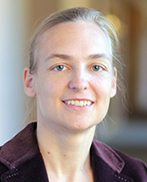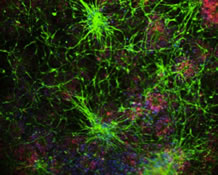Columbia University
Irving Medical Center
Neurological Institute
710 West 168th Street, 3rd floor
(212) 305-1818
Featured Research
In the Lab:
Christiane Reitz, MD, PhD
 Christiane Reitz, MD, PhD
Christiane Reitz, MD, PhDThe main focus of my research lies on the identification of genetic risk factors for Alzheimer's disease (AD) and related neurodegenerative disorders. The critical foundation for this work is the targeted collection of selected patient cohorts with an apparent high genetic load of the disease under study, such as rare but well-documented families, nuclear families with at least two affected family members, pedigrees with marked variability in disease penetrance and expression, or families with extreme or distinctive endophenotypes, such as very early disease onset.
In collaboration with Dr. Richard Mayeux and the Laboratory for Genetic Epidemiology, I work with data from the National Institute of Aging Late-Onset Alzheimer's Disease (NIA-LOAD) Study and the Estudio Familiar de Influencia Genetica en Alzheimer (EFIGA), collections of non-Hispanic White and Caribbean Hispanic families multiply affected by AD. In addition, we are currently in the process of assembling cohorts of multiplex African American families with late-onset AD (LOAD), and families loaded for early-onset AD (EOAD), for gene identification. In these distinct cohorts with unique genetic heritage, we employ advanced genetic and genomic approaches, including whole exome and genome sequencing, large-scale targeted re-sequencing, and RNA sequencing approaches to identify rare, highly penetrant risk and disease modifying genetic variations. Identification of such variants is expected to enhance our understanding of the molecular mechanisms underlying dementia, in the hope of generating diagnostic and therapeutic strategies that are better tailored to a patient's specific genetic make-up. Current projects in this area include:
Collection and Whole Genome Sequencing of Families Loaded for Early-onset Alzheimer's disease.
After the discovery of APP, PSEN1, and PSEN2 in families with autosomal dominant EOAD, gene discovery in familial EOAD came more or less to a standstill. Mutations in these three genes, however, explain less than 10% of EOAD cases. Few studies have been performed in families with EOAD cases without clear Mendelian inheritance patterns that often have a mix of early and late-onset cases, and account for over 90% of EOAD cases. The few studies that have assessed this EOAD subgroup have suggested that the genetic architectures might overlap with the late-onset form, but only partially. Thus, studying EOAD in subjects without known mutations (i.e. unexplained EOAD) is a critical gap that provides a unique opportunity to clarify disease mechanisms and discover novel targets for prevention or treatment.
To begin addressing this issue, we are collecting, in collaboration with Dr. Gary Beecham at the University of Miami, families with two or more early-onset cases that are lacking mutations in APP, PSEN1 and PSEN2. These families will undergo whole-genome sequencing and other genomic analyses to identify variants explaining disease in these families.
Whole-genome Sequencing in Multiplex African American families with late-onset Alzheimer's disease.
African Americans have a higher prevalence of dementia than non-Hispanic Whites. Despite steady improvement in the overall health of the U.S. population, individuals within this group continue to be vulnerable to lapses in care and are at increased risk for health problems and shortened life expectancies. The determinants of the health disparities seen in African Americans are many, including public health policy, clinical practices, and social, economic, cultural and/or language factors. However, one promising avenue for reducing health disparities is the use of precision medicine to improve disease prediction, prevention, diagnosis, and treatment. Critical for the success of precision medicine is the inclusion of these underserved groups in both research and clinical applications.
In collaboration with Drs. Pericak-Vance and Gary Beecham at the University of Miami, Dr. Goldie Byrd at North Carolina A&T State University, and Dr. Richard Mayeux, we are collecting multiplex African American families with a high load of late-onset Alzheimer's disease cases for whole-genome sequencing. We hope that comprehensive genomic analyses in this understudied population will reveal novel genetic variants associated with AD etiology.
Christiane Reitz, MD, PhD
Assistant Professor of Neurology and Epidemiology (in the Gertrude H. Sergievsky Center and the Taub Institute for Research on Alzheimer’s disease and the Aging Brain)
cr2101@cumc.columbia.edu

